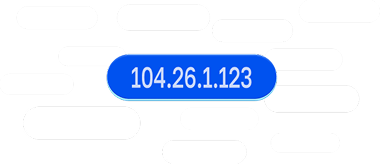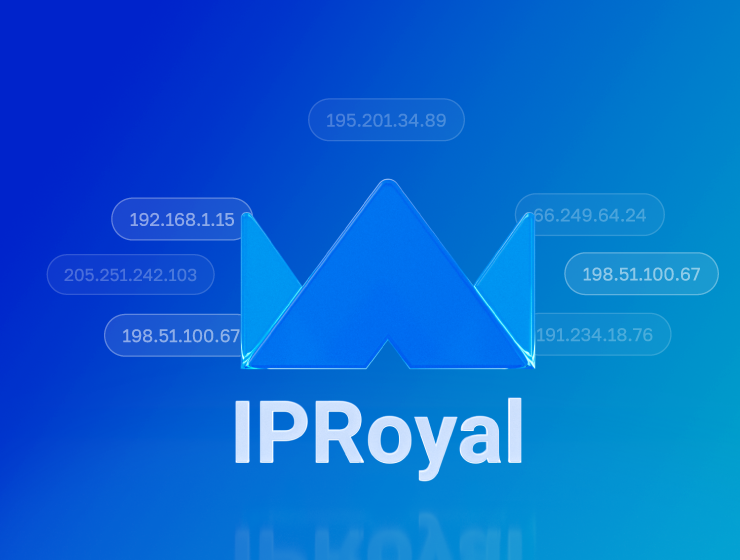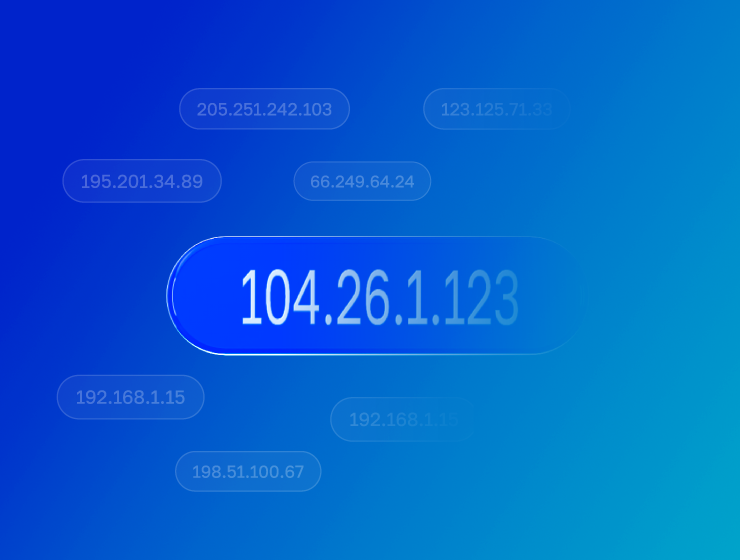Proxies aren't just for IT folks anymore. Today, students use them to access blocked educational resources, marketers spy on competitors, and regular people watch content that's not available in their country.
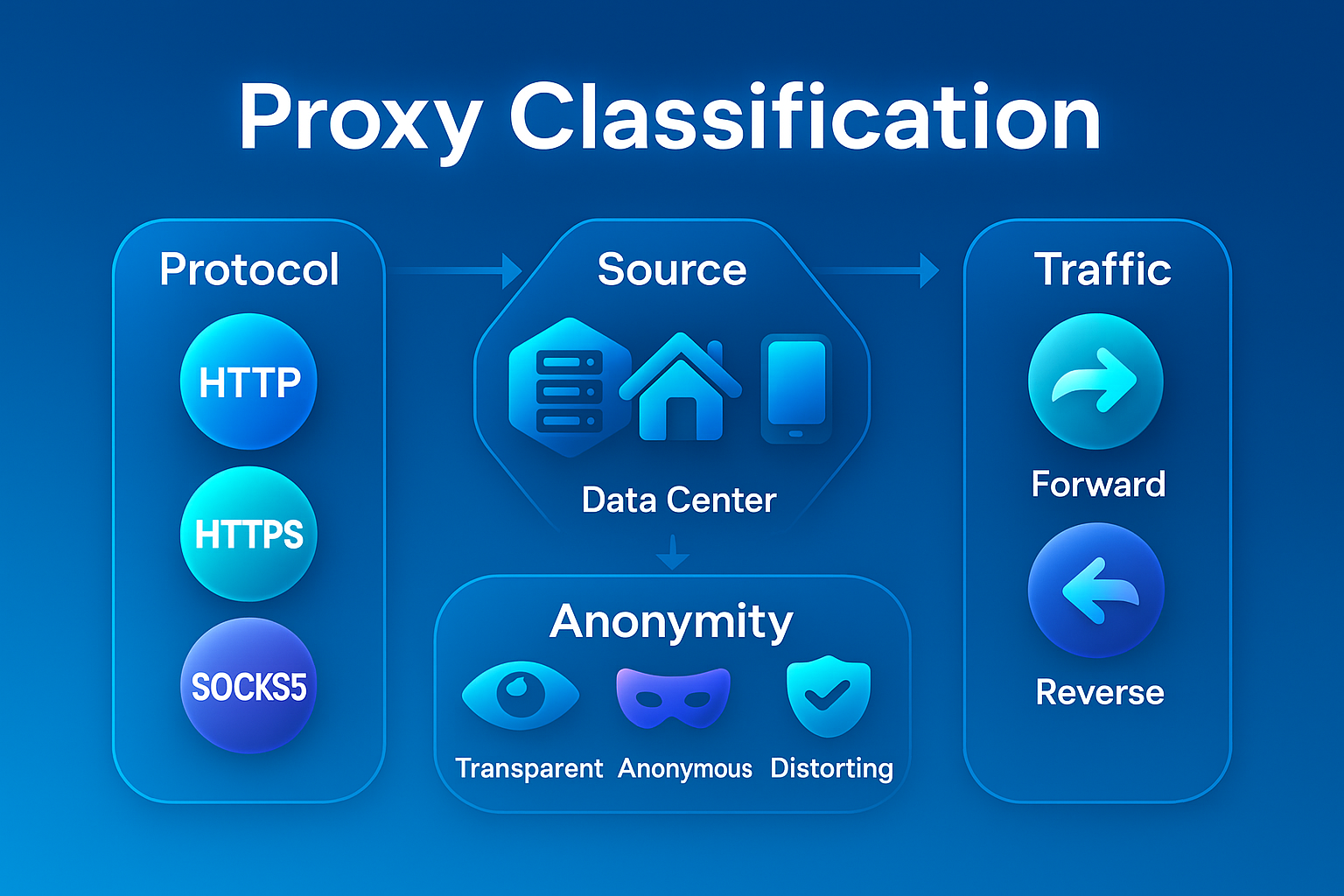
Proxies come in all shapes and sizes - there's a type for every job. Let's break down the main types, their features, and where they come in handy. We'll also look at how to pick what you actually need and check if your proxy is working properly.
Contents
- What an Anonymous Proxy Service Represents
- How an Anonymous Proxy Works
- Proxy Anonymity Levels
- Types of Anonymous Proxies
- Main Benefits of Using Anonymous Proxies
- Risks and Limitations
- How to Set Up and Use an Anonymous Proxy
- Solving the "Anonymous Proxy Detected" Error
- How to Choose a Reliable Anonymous Proxy Service
- FAQ
- Conclusion
- VPN and Proxy: Key Differences
- What is a Proxy Server?
- What is VPN?
- Security and Privacy
- Speed and Performance
- When Should You Use a Proxy Server?
- When Should You Use VPN?
- Is It Worth Using VPN and Proxy Together?
- Mistakes When Choosing Between VPN and Proxy
- Busting Myths About VPN and Proxy
- VPN or Proxy: How to Choose the Right Option?
- FAQ
- Conclusion
- What is a proxy server for Google Chrome and why do you need it
- How proxy works in Chrome browser
- Ways to configure proxy in Google Chrome
- Setting up proxy in Google Chrome through Windows
- Setting up proxy in Google Chrome through macOS
- Setting up proxy for Chrome through extensions
- Setting up proxy in Chrome on Android
- Setting up proxy in Chrome on iPhone and iPad
- Connection check and speed test
- Typical errors when working with proxy in Chrome
- FAQ
- Conclusion
- Why you need proxies for Reddit
- Why Reddit might be blocked
- What restrictions does Reddit have
- Who needs proxies and how they help
- What you can do with proxies for Reddit
- How to choose the right type of proxy for Reddit
- Proxy vs VPN for Reddit
- How to set up and use proxies for Reddit
- Top proxy providers for Reddit in 2025
- Common problems and solutions
- Practical use case scenarios
- FAQ
- Conclusion
- Why LinkedIn requires using proxies
- How proxies help in working with LinkedIn tools
- Types of proxies for LinkedIn and selection criteria
- 10 best proxy providers for LinkedIn
- Setting up and using proxies
- Tips for safe LinkedIn outreach scaling
- FAQ
- Conclusion: how to build a stable system for working with LinkedIn through proxies
- How Amazon detects and blocks proxies
- Benefits of using proxies for Amazon
- Which proxy types work best for Amazon
- Best residential proxy providers for Amazon (2025)
- Key features of a good Amazon proxy provider
- How to set up a proxy for Amazon
- Common problems when working with proxies on Amazon
- How to use Amazon proxies for different tasks
- Best practices for safe Amazon proxy usage
- FAQ
- Conclusion – choose stability, not quantity
- Step 1 — Download and Install VMLogin
- Step 2 — Create a New Browser Profile
- Step 3 — Get Your Gonzo Proxy Credentials
- Step 4 — Configure Proxy Settings in VMLogin
- Step 5 — Verify Proxy Connection
- Step 6 — Launch Your Browser Profile
- Step 7 — Optional: Set Up Multiple Profiles / Rotating Sessions
- Step 8 — Troubleshooting Common Issues
- Step 9 — Start Automating with Gonzo Proxy + VMLogin
- What is an anonymizer in simple terms
- How anonymizers differ from proxies and VPNs
- How an anonymizer works
- Types of anonymizers and anonymity levels
- How to format proxies for working with anonymizers
- How to use an anonymizer to access blocked sites
- Advantages and risks of using anonymizers
- How to choose an anonymizer or proxy for your tasks
- FAQ
- Conclusion
- How to sell quickly and effectively on Avito
- What is mass posting on Avito and why you need it
- Manual and automated mass posting
- Multi-accounting: how to manage multiple accounts on Avito
- Step-by-step launch plan
- How not to get banned with mass posting and multi-accounting
- Mass posting vs alternative sales methods
- FAQ
- Conclusion
- Why TikTok gets blocked and doesn't always work with VPN
- How proxies and VPN differ for TikTok
- When it's better to choose VPN for TikTok
- When it's better to choose proxy for TikTok
- How to set up proxy for TikTok (short instruction)
- Risks and precautions when working with TikTok through VPN and proxies
- FAQ
- Conclusion
- What does transparent proxy mean
- How transparent proxy works in a real network
- Spheres of application for "invisible" proxy
- Advantages and disadvantages of transparent proxy
- Setting up transparent proxy: step by step
- Are transparent proxies secure
- Popular solutions for transparent proxy setup
- Checklist for working with transparent proxies
- FAQ
- Conclusion
- Why proxies are a must for Dolphin Anty
- Types of proxies you can connect to Dolphin
- Rotating vs Static
- Step-by-Step: How to Add a Proxy in Dolphin Anty
- Common proxy connection errors and fixes
- How to choose reliable proxies for Dolphin Anty
- Tips for optimizing costs
- Practical cases of using Dolphin Anty with proxies
- FAQ
- Final thoughts
- Types of proxies used for parsing
- How to choose proxies for parsing
- Setting up and rotating proxies for parsing
- Technical tricks for bypassing blocks
- Practice: building a proxy pool for parsing
- Metrics and monitoring parsing quality
- Best practices and ready solutions
- FAQ
- Summary: Which proxy to choose for parsing
- How proxies work in traffic arbitrage
- Types of proxies for arbitrage and their features
- What problems do proxies solve in arbitrage
- Top proxy providers for arbitrage in 2025
- Comparison table of proxy providers
- How to pick the right proxies for arbitrage
- How to set up proxies for arbitrage
- Safe proxy usage tips
- FAQ
- Conclusion
- What are residential proxies needed for?
- How do residential proxies work?
- How do residential proxies differ from others?
- Connecting residential proxies from GonzoProxy
- Examples of using GonzoProxy residential proxies in Python
- Pros and cons of residential proxies
- How to check residential proxies
- Common usage errors
- FAQ
- Conclusion
- Why does Facebook often block accounts and cards?
- Why use a virtual card for Facebook Ads?
- Multicards.io — a trusted virtual card service for Meta Ads
- Should you buy or create Facebook ad accounts?
- Why proxies are essential
- What kind of proxies are best for Facebook Ads?
- GonzoProxy — premium residential proxies for Facebook Ads
- How to safely link a virtual card to Facebook Ads
- Final recommendations
- What’s a DePIN farm and why should you care?
- So, what exactly is DePIN?
- Other DePIN projects already killing it
- What do you need to start your DePIN farm?
- How to create profiles and set up the antidetect browser
- How to choose and set up a proxy?
- What about Twitter/X accounts?
- How to get email accounts?
- Before you launch — one last tip!
- How to properly chain your accounts?
- How modern fraud detection systems track violators
- Google Ads: anti-fraud specifics in 2025
- How to tell your proxies aren't working?
- Why most proxies no longer work with ad platforms
- How to select and verify proxies for ad platforms
- Strategy for stable operation with ad platforms
- Conclusion: don't skimp on infrastructure
A proxy is basically a middleman between your computer and websites. You send a request, it goes to the proxy, and then the proxy talks to the website on your behalf. When it gets a response, the proxy sends it back to you.
IP replacement and traffic routing through proxies
When you work through a proxy, websites see the proxy's IP address, not yours. Here's what that gets you:
- Bypassing regional restrictions
- Hiding your real location
- More privacy online
- Working with multiple accounts at once
- Faster loading for frequently visited sites
How proxies differ from VPNs and other anonymization methods
Key differences:
Traffic coverage: VPN encrypts all your device's traffic, proxies only work with specific programs.
Encryption: VPN always encrypts data, proxies might work with minimal or no encryption at all.
Speed: Proxies are usually faster - they don't waste resources on full encryption. GonzoProxy has high-speed servers with minimal lag.
Flexibility: Through proxies, you can set up different programs to use different servers.
Why regular people need proxies
Everyday uses:
To access popular platforms restricted in certain countries — like YouTube, Instagram, TikTok, X (Twitter), Facebook, Spotify and others — people often use European proxies. Services like GonzoProxy provide EU IPs that help bypass regional blocks and give full access to social media, streaming services, and news sites.
- Save money: prices for goods and services vary by country - you can find better deals
- Café security: extra protection when using public Wi-Fi
- Less tracking: ad networks have a harder time following your activity
By protocol and application
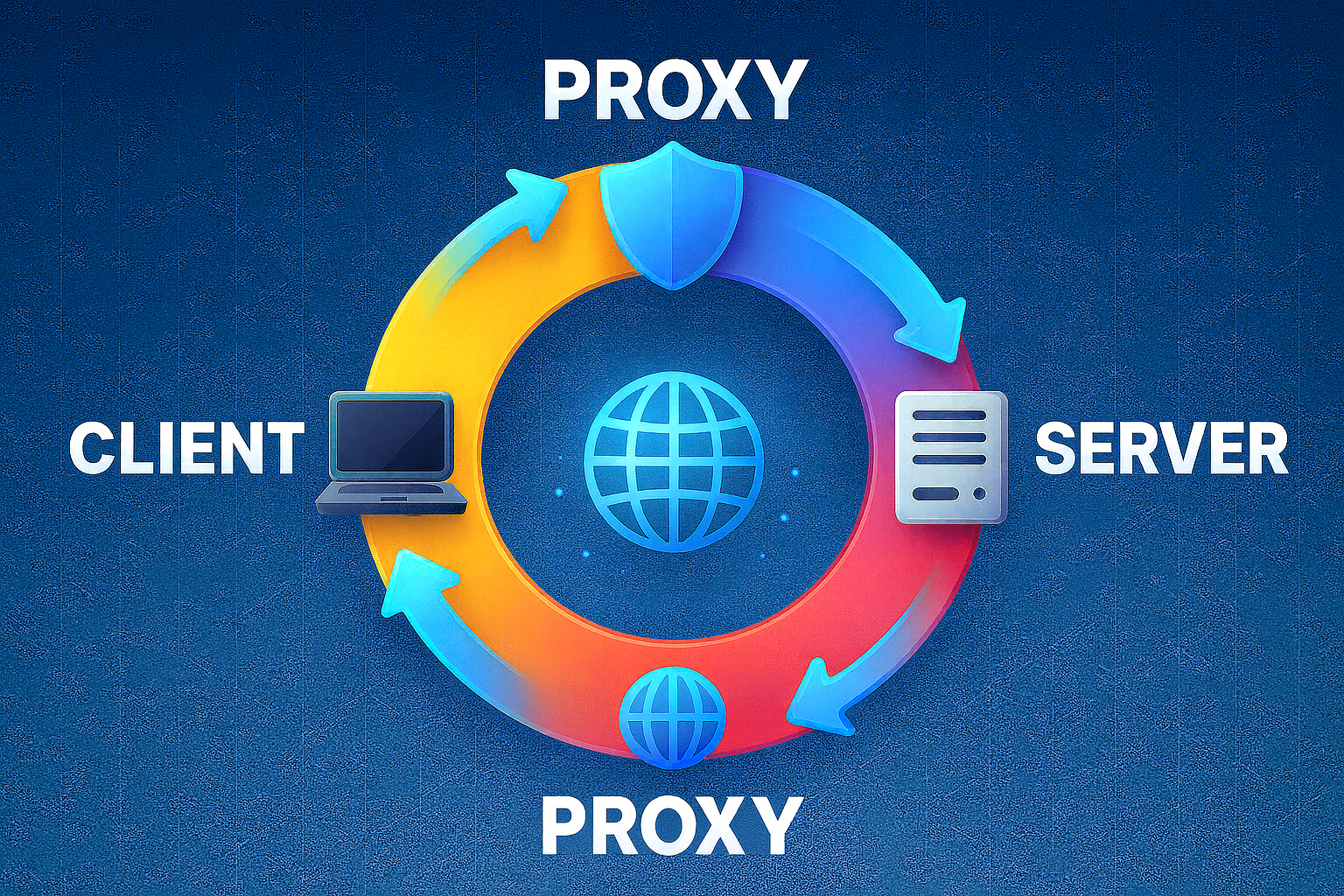
HTTP / HTTPS
HTTP proxies work with web traffic. They understand the HTTP protocol and can cache pages for quick reloading. The HTTPS version adds basic encryption.
Pros:
- Fast web request processing
- Save bandwidth through caching
- Work with all browsers
- Can filter content
Cons:
- Only work with HTTP/HTTPS
- Might keep logs of your activity
- Can see transmitted data
Where to use: web browsing, website parsing, corporate access control.
SOCKS5
Universal proxy type at the transport level. Works with any protocols and traffic types without interfering.
Features:
- Works with UDP
- Has authentication
- Supports IPv6
- Excellent throughput
Where needed: torrents, gaming, messengers, professional parsing. SOCKS5 from GonzoProxy works reliably with any software.
DNS / SMTP / FTP
Specialized proxies for specific protocols:
TOR, CGI, SmartDNS
TOR proxies work through the Tor network:
- Multi-layer encryption
- Maximum anonymity
- Access to .onion sites
- Slow speed
CGI proxies work through a web interface:
- No system setup needed
- Easy to use
- Limited capabilities
SmartDNS combines DNS and proxy:
- Removes geographic restrictions
- Maximum speed without encryption
- Great for streaming
By location and IP source
Datacenter Proxies
Located in data centers, use hosting provider IPs.
Pros:
- Excellent speed
- Stable operation
- Low price
Cons:
- Easily detected by protection systems
- Often blocked by popular platforms
- Look unnatural to websites
Residential proxies
Use regular ISP IPs, look like home users.
Pros:
- Websites trust them
- Rarely blocked
- Work great with social media
- Wide country selection
Cons:
- More expensive than other types
- Speed can fluctuate
Among services providing access to residential IPs in over 100 countries, GonzoProxy stands out — a provider focusing on connection stability and wide geolocation choice.
Mobile proxies
Use mobile carrier IPs, maximally natural traffic.
Features:
- IP changes automatically
- Platforms trust them the most
- Almost impossible to block
- Mimic mobile behavior
Applications: SMM, affiliate marketing, mobile app testing.
Services like GonzoProxy provide mobile and residential proxies with fine-tuning options — IP retention, timer-based rotation or on-demand, country and region selection. This is handy when you're building infrastructure for a specific use case.
By level of anonymity
Transparent proxies
Don't hide your IP or the fact you're using a proxy. Pass all information in headers.
Applications:
- Corporate caching
- Parental controls
- Employee monitoring
- Speed boost
Anonymous proxies
Hide your real IP but show you're using a proxy.
Good for:
- Protection from web analytics
- Bypassing simple blocks
- Blocking personalized ads
Elite (High-Anonymous) proxies
Completely hide both your IP and the fact you're using a proxy. Indistinguishable from regular users.
Essential for:
- Professional parsing
- Social media work
- Confidential research
- Serious testing
Most proxy services don't hold up under serious anonymity checks. GonzoProxy uses technologies that make traffic indistinguishable from regular users.
By traffic direction
Forward proxy
Regular proxy type, works on behalf of the client to access the internet.
Flow: Your computer → Proxy → Website
Reverse proxy
Works on behalf of the server, accepts requests and distributes them among company servers.
Flow: Your computer → Reverse proxy → Company servers
Applications:
- Load balancing
- DDoS protection
- Caching
- SSL termination
By service model
Dedicated / Private
Provided only to you, maximum speed without other users' influence. GonzoProxy gives dedicated proxies with full control.
Shared / Public
Used by several people simultaneously. Cheaper, but speed can drop under high load.
Rotating proxies
Automatically change IPs at set intervals. Essential for mass parsing.
GonzoProxy has two modes for rotating residential proxies:
1. Sticky IP: IP holds for a certain time (30 seconds to 7 days)
2. Randomize IP: new IP for each request
Selection based on use case
Web scraping and data collection
Main thing - reliability and resistance to blocks.
What to get:
- Rotating residential for complex projects
- Datacenter for simple tasks
- SOCKS5 for protocol flexibility
Accessing geo-blocked content
Anonymity and server location matter.
Best choice:
- Residential proxies from the needed country
- Elite anonymity level
- HTTPS for data protection
SMM, affiliate marketing, multi-accounting
Need maximally natural behavior.
What works:
- Mobile proxies for social media
- Residential from different subnets
- Separate proxy for each account
Testing and automation
Stability and parameter control are important.
Suitable types:
- Datacenter for speed
- SOCKS5 for different protocols
- Static IPs for repeatable tests
DePIN farming
Participating in decentralized networks needs special settings. GonzoProxy has optimized solutions for DePIN. Details in the special guide.
IP location and stability
Choose proxies in needed countries with stable IPs.
Speed, anonymity, protocol type
Set priorities: for parsing speed matters, for privacy - anonymity, for specific tasks - support for needed protocols.
Number of IPs and rotation settings
Large projects need many IPs with customizable rotation.
How to check If your proxy works
Browser-level proxy testing
Set up the proxy in your browser and visit an IP checker site. If the address changed - the proxy works.
Tools and API-based checks
Speed testing:
- SpeedTest.net for general measurements
- Fast.com for quick checks
- Special tools for precise measurements
Anonymity test:
- Whoer.net for comprehensive checking
- DNSLeakTest.com for DNS leak checks
- IPLeak.net for WebRTC leaks
How to tell if your PC is connected via proxy
To find out if a proxy is being used on your computer:
- Windows: Settings → Network & Internet → Proxy
- macOS: System Preferences → Network → Advanced → Proxies
- Command line: use netstat or curl commands
Get GonzoProxy if:
1. Speed is critical
2. Working with large volumes
3. Need flexible settings for different programs
4. Want to save money
5. Need professional support
Get VPN if:
1. Need to protect all device traffic
2. Often use public Wi-Fi
3. Want one-click setup
4. Provider protection matters
FAQ
What types of proxies exist - in short
Proxies differ by protocols (HTTP, HTTPS, SOCKS5), IP sources (datacenter, residential, mobile), anonymity (transparent, anonymous, elite) and service model (private, shared, rotating). GonzoProxy has all types for any task.
How to find the best proxy
First, figure out your goal. For parsing, get rotating residential, for bypassing blocks - elite with the right geography, for SMM - mobile. Look for balance between speed, anonymity and price.
Practical tips
- Always test proxies before buying large packages
- Use different types for different tasks
- Monitor server availability
- Don't skimp on quality for important projects
- Choose providers with good support
- Keep up with new proxy technologies
Ready to start working with professional proxies? Check out GonzoProxy rates and use promo code START15 for 15% off your first purchase.





